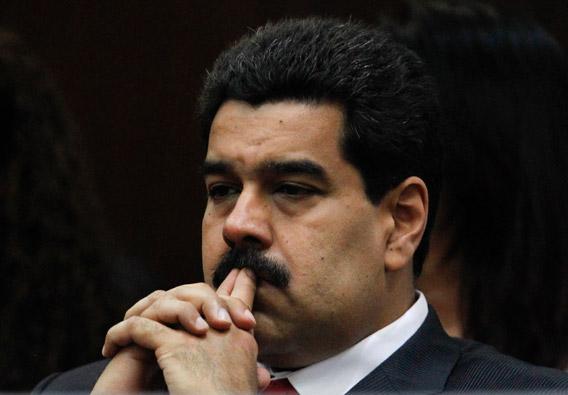Update: Upon closer review of (an English-language translation of) Venezuela’s constitution, NBC News’ explanation of the succession rules appears to be incorrect, meaning that Hugo Chávez’s hand-picked successor may not have “ignored” the constitution as a previous headline on this blog post implied.
Chávez, who first assumed the presidency in 1999, existed in something of a constitutional gray area at the time of his death. While he won his latest six-year term in October 2012 while battling cancer, he was never officially sworn in as president for a fourth time when that term technically began in mid-January. So depending on your reading of the constitution, Chávez was either president or president-elect at the time of his death. Why does that matter? If he was the former, under the constitution Vice President Nicolas Maduro was correct in assuming the role as interim president. If Chávez was the latter, than Maduro jumped the head of the National Assembly in the order of succession.
Here’s a translation of the relevant section, as it was rewritten in 1999 by Chávez and his allies:
When an elected President becomes permanently unavailable to serve prior to his inauguration, a new election by universal suffrage and direct ballot shall be held within 30 consecutive days. Pending election and inauguration of the new President, the President of the National Assembly shall take charge of the Presidency of the Republic. When the President of the Republic becomes permanently unavailable to serve during the first four years of this constitutional term of office, a new election by universal suffrage and direct ballot shall be held within 30 consecutive days. Pending election and inauguration of the new President, the Executive Vice-President shall take charge of the Presidency of the Republic.
The Chicago Tribune highlighted the stakes back in January, several days before Chávez’s inauguration was postponed, and at a time when some of Chávez’s opponents were wondering aloud whether Maduro would withhold news of Chávez’s death in order to remain in power. Here’s their reading, which is a little simpler to understand:
There’s nothing gray about what’s supposed to happen if [Chavez] dies: an election within 30 days. But the timing of his death matters greatly, depending on how you interpret the constitution. If a president dies, the vice president is to serve as interim president until the election; if a president-elect dies before inauguration day, the reins pass temporarily to the president of the National Assembly. In this case that would be Diosdado Cabello, who has strong ties to military leaders — whose loyalty to Chavez is not necessarily transferable to Maduro.
So whether Maduro ignored the constitution when he took over for Chávez upon his death depends on your particular reading of the Venezuelan constitution. NBC News, the Associated Press and several other outlets were among those that, upon an initial reading at least, considered Chavez to be president-elect. But given that the vast majority of the world, as well as the Venezuelan government itself, considered Chávez to still be president—despite his noticeable absence in public during his illness—the consensus would suggest that Maduro has a constitutional claim to his current role as interim president.
*** ***** ***
Original Post: Here’s NBC Latino’s Kristina Puga with a refresher for those unfamiliar with the Venezuelan constitution:
According to Venezuela’s constitution, if the president relinquishes power because of his physical inability to perform his duties, this is considered an “absolute absence,” which a medical committee has to certify. However, because the president has died, the constitution mandates that new elections take place within 30 days. Venezuela’s constitution specifies that the speaker of the National Assembly, currently Diosdado Cabello, should assume the interim presidency if a president can’t be sworn in.
And yet, here’s the Associated Press on what actually happened:
Even in death, Hugo Chavez’s orders are being followed. The man he anointed to succeed him, Vice President Nicolas Maduro, will continue to run Venezuela as interim president and be the governing socialists’ candidate in an election to be called within 30 days. Foreign Minister Elias Jaua confirmed that Tuesday, just hours after Maduro, tears running down his face, announced the death of Chavez, the larger-than-life former paratroop officer who had presided over Venezuela as virtually a one-man show for more than 14 years.
Maduro is the front-runner to win the upcoming election, thanks in large part to the fact that Chávez, who enjoyed strong public support right up until his death, designated him as his political successor. He’s expected to face off against Henrique Capriles Radonski, a young state governor who lost to Chávez in this past October’s presidential election.
